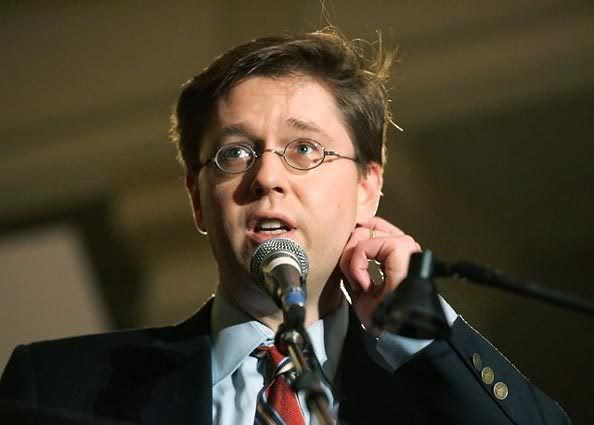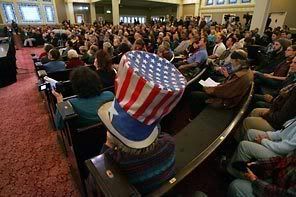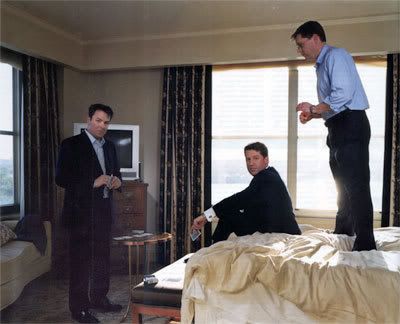 FCC Chairman Kevin Martin, who has voted in the past for more media consolidation, was met with boos and catcalls when he opened hearings at Seattle's Town Hall on Friday.
FCC Chairman Kevin Martin, who has voted in the past for more media consolidation, was met with boos and catcalls when he opened hearings at Seattle's Town Hall on Friday.The Seattle Times reports:
That was the overwhelming message an overflow crowd delivered to the Federal Communications Commission Friday night at a hearing on media ownership at Seattle's Town Hall.
Four FCC commissioners heard it from Gov. Christine Gregoire and Attorney General Rob McKenna, and from young media-reform activists costumed as "media-consolidation zombies" — a dig at what many perceive as the FCC's willingness to do industry's bidding.
"You become a zombie when your voice isn't heard," said Monica Olsson, dressed as a zombie. "That's what we're here to stop."
The FCC is reviewing rules that restrict how many local media outlets a single company can own. Among them: a 32-year-old regulation barring a company from owning a daily newspaper and TV or radio station in the same market.
Most media companies say the restrictions should be eased or eliminated. Many people who spoke Friday said they're certain that's what the FCC's Republican majority already has decided to do.
If the FCC quickly proposes new rules, "you know your input was dismissed," said Jonathan Adelstein, one the five-member commission's two Democrats.
More than 200 people signed up to testify, almost all of them opposed to the proposed rules.
They included directors of several cable-access channels in smaller markets, such as South King County, Olympia and Salem, Ore., where local news and issues rarely get mentioned on TV news channels based in Seattle, Portland or Eugene.
"These markets that everybody mentions, these are towns, cities, communities, full of people," said Chris Miller, operations director of Puget Sound Access in Kent.
Miller recounted growing up in a small South Dakota town where local media were bought out by corporate interests. He said he learned about it the hard way as a 17-year-old, calling his favorite radio station to request a song, only to discover the station no longer employed a local disc jockey.
The FCC adopted looser rules in 2003 over the objection of the commission's two Democratic members, touching off widespread protests. A federal appeals court struck down the changes, ruling the commission had not adequately justified them.
 More than 200 people signed up to testify at Friday's hearing; almost all opposed new rules that would relax restrictions on how many local media outlets a company can own.
More than 200 people signed up to testify at Friday's hearing; almost all opposed new rules that would relax restrictions on how many local media outlets a company can own.Last year, however, the commission announced it would take up the issue again. Chairman Kevin Martin, who supported the 2003 changes, indicated recently he wants a vote next month.
The FCC gave just one week's advance notice for the Seattle hearing. Many who attended cited that as evidence the commission majority isn't really interested in the public's views.
 FCC Chairman and former lobbyist, Kevin Martin (right) playing cards with a telecom lobbyist (center) and a radio industry executive (left).
FCC Chairman and former lobbyist, Kevin Martin (right) playing cards with a telecom lobbyist (center) and a radio industry executive (left).The general managers of Seattle's KING-TV and KCPQ-TV were among the handful of witnesses who did not call for preserving the current media-ownership rules. Their respective owners, Dallas-based Belo and Chicago-based Tribune, already own newspaper-TV combinations in other cities that predate the FCC ban.
KCPQ's Pamela Pearson said she had worked in two of those markets, Chicago and Los Angeles. "We do not combine our newsrooms or smoosh them together. They run independently to produce the best journalism," she said.
Major media companies say the ownership restrictions no longer are needed because new technology — the Internet, cable TV, satellite radio — has produced new media voices.
But Ian Page-Echols, a Seattle documentary filmmaker and artist, said unbridled access to the Internet is threatened by media conglomerates who could control the Internet and restrict access to it.
Seattle Times Publisher Frank Blethen, an outspoken foe of more consolidation, urged the commission to not only maintain existing restrictions, but adopt new ones — including a ban on cross-ownership of national print and broadcast outlets to supplement the existing prohibition on local cross-ownership.
Rupert Murdoch's News Corp., which owns the Fox network, recently acquired The Wall Street Journal.
Concentrated absentee media ownership has resulted in "a disinvestment in journalism, causing serious erosion in America's public-policy literacy and civic engagement," Blethen said.
Mark Allen, president and chief executive of the Washington State Association of Broadcasters, disagreed. "It is simply not true that fewer owners equals less service and more owners equals more service in every instance," he said.
John Carlson, KVI-AM talk show host and former Republican candidate for governor, said chains aren't necessarily bad, but since a limited number of radio and TV frequencies are available, "a referee must protect the ability of local, smaller media companies to compete."
Diana Kramer, associate publisher of Renton Magazine and The Business Report, sounded a similar note.
"I do not want one company to provide all my food or all my fuel. And I do not want one company to provide all my news," she said.
When Martin, the FCC chairman, rose to deliver opening remarks, he was greeted with catcalls and boos.
He said Blethen is in the minority among newspaper publishers in supporting the current rules. Most, he said, say they need more opportunities to diversify to avoid more newsroom cuts.
Since last summer, according to a database on the FCC's Web site, Washington residents have submitted more than 6,000 comments on media-ownership rules. Almost all oppose looser restrictions.
"With local consolidation, you simply have fewer original voices and fewer innovative voices being heard," said Lynn Ziegler, a local advocate for quality children's television. "That already is happening."